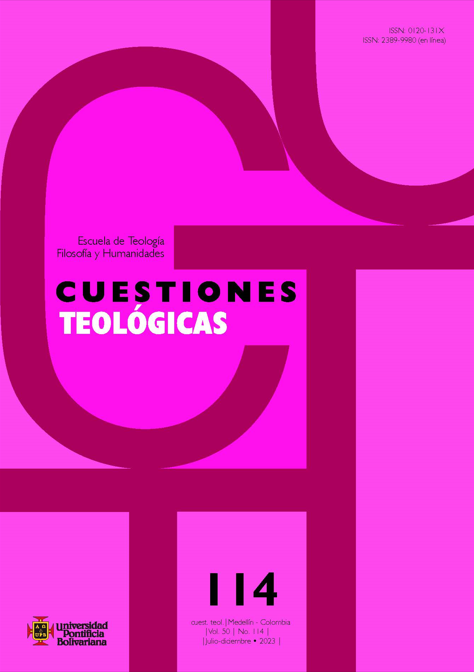The Memory of Slavery as a Source of Justice and Solidarity: Exegesis of Deuteronomy 5:15, 15:15, 16:12, 24:18, 22
Main Article Content
Abstract
The slavery endured in Egypt is a tradition that runs through the entire Scripture. Among its numerous mentions, the book of Deuteronomy presents five texts with a similar wording: 'remember that you were a slave in [the land of ] Egypt' (Deuteronomy 5:15, 15:15, 16:12, 24:18, and 24:22), inviting to recall the oppression and act in favor of the poor, as God did. In this work, firstly, these five formulas are analyzed using various instances of the historical-critical method. Then, in the second part, an exegetical exercise is carried out, highlighting how the memory of slavery in Egypt becomes an exhortation to care for the poor, allowing them to celebrate the Sabbath and Pentecost, freeing Hebrew slaves, and taking care of the needy. In a world where human trafficking, slavery, inhumane working conditions, hunger, and other forms of oppression persist, this study seeks to contribute to the reflection on how a painful memory can be transformed into a liberating praxis.
References
Alonso Schökel, L. (1994). Diccionario hebreo-español. Trotta.
Alonso Schökel, L. (1996). Biblia del peregrino. Antiguo Testamento. Prosa. Edición de estudio I. Verbo Divino.
Callender, D. (1998). Servants of god (s) and servants of kings in Israel and the ancient near east. Semeia, (83/84), pp. 67-82.
Chianeque, L. C. y Ngewa, S. (2010). Deuteronomio. En T. Adeyemo (Ed.). Comentario bíblico africano (pp. 211- 256). Mundo Cristão.
Chirichigno, G. (1993). Debt-slavery in Israel and the ancient near east. Sheffield Academic Press.
Cole, H. R. (2000). The sabbath and the alien. Andrews University Seminary Studies, 38(2), pp. 223-229. https://digitalcommons.andrews.edu/auss/vol38/iss2/4/
Elliger, K., Rudolph, W. y Schenker, A. (1997) Biblia hebraica stuttgartensia. Deutsche Bibelgesellschaft.
Escuela Bíblica de Jerusalén (1998). Biblia de Jerusalén. Desclée De Brouwer.
Eshel, E. (1991). 4QDeutn - A text that has undergone harmonistic editing. Hebrew Union College Annual, (62), pp. 117-154.
García López, F. (1989). El Deuteronomio, una ley predicada. Verbo Divino.
García López, F. (2003) “ צוה ”. En G. J. Botterweck et al. (Eds.), Theological Dictionary of the Old Testament XII (pp. 276-296). Eerdmans.
Greifenhagen, F. V. (2002). Egypt on the Pentateuch's ideological map. Constructing biblical Israel's identity. Sheffield Academic Press.
Houston, W. J. (2007). Contending for justice. Ideologies and theologies of social justice in the Old Testament. T. & T. Clark.
Leon-Dufour, X. (1990). Vocabulario de teología bíblica. Herder.
Lohfink, N. (1991). Poverty in the laws of the ancient near east and of the bible. Theological Studies, 52(1), pp. 34-50
McConville, J. G. (1984). Law and theology in Deuteronomy. Sheffield Academic Press.
Nelson, R. D. (2002). Deuteronomy. A commentary. Westminster John Knox.
Otto, E. (1999). Das Deuteronomium. Politische theologie und rechtsreform in juda und assyrien. De Gruyter.
Preuss, H. D. (1990). “ יצא ”. En G. J. Botterweck et al. (Eds.), Theological Dictionary of the Old Testament VI (pp. 225-250). Eerdmans.
Römer, T. (2018). The role of Egypt in the formation of the Hebrew Bible. Journal of Ancient Egyptian Interconnections, 18(1), pp. 63-70. https://journals.librarypublishing.arizona.edu/jaei/article/id/1340/
Soltero, C. (2005). Deuteronomio. En A. J. Levoratti (Ed.), Comentario bíblico latinoamericano. Antiguo Testamento I (pp. 559-597). Verbo Divino.
Stenger, W. (1990). Los métodos de la exegesis bíblica. Herder.
Terblanche, M. (2016). Jeremiah 34:8-22. A call for the enactment of distributive justice? Acta Theologica, 36(2), pp. 148-161.
Ulrich, E. (2010). The biblical qumran scrolls. Brill.
Vengeyi, O. (2013). Aluta continua biblical hermeneutics for liberation: Interpreting biblical texts on slavery for liberation of zimbabwean underclasses. University of Bamberg Press.
Verkindere, G. (2001). La justicia en el Antiguo Testamento. Verbo Divino.






